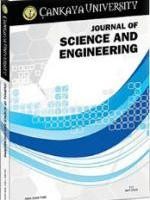Comparison of Sample Preparation Techniques Used in Luminescence Dating Methods
Comparison of Sample Preparation Techniques Used in Luminescence Dating Methods
Luminescence dating, sample preparation technique crushing, sieving,
___
- [1] M.J. Aitken, Thermoluminescence Dating, Academic Press, London 1985.
- [2] M.J. Aitken, An Introduction to Optical Dating, Oxford University Press, Oxford 1998.
- [3] G. A. T. Duller, Luminescence Dating: Guidelines on Using Luminescence Dating in Archaeology, English Heritage, Swindon 2008.
- [4] G. Tanır, N. Meric, H. Aytekin and S. Okuducu, A fitting procedure for palaedose from old sandstone using IRSL, Czechoslovak Journal of Physics 54 (2004), 941–946.
- [5] N. Meric, M. Kosal, M. A. Atlıhan and U. R. Yuce, OSL properties of anthropological bone and tooth, Radiation Physics and Chemistry 77 (2008), 685–689.
- [6] N. Meric, M. A. Atlıhan, M. Kosal, U. R. Yuce and A. Cınaroglu, Infrared stimulated luminescence and thermoluminescence dating of archaeological samples from Turkey, Geochronometria 34 (2009), 25–31.
- [7] M. A. Atlıhan and N. Meric, Luminescence dating of a geological sample from Denizli, Turkey, Applied Radiation and Isotopes 66 (2008), 69–74.
- [8] U. R. Yuce, N. Meric, O. Atakol and F. Yasar, Dose response of hydrazine - Deproteinated tooth enamel under blue light stimulation, Radiation Measurements 45 (2010), 797–800.
- [9] N. A. Spooner, M. J. Aitken, B. W. Smith, M. Franks and C. McElroy, Archaeological dating by infrared-stimulated luminescence using a diode array, Radiation Protection Dosimetry 34 (1990), 83–86.
- [10] A. G. Wintle, Luminescence dating: laboratory procedures and protocols, Radiation Measurements 27 (1997), 769–817. [11] S. Toyoda, W. J. Rink, H. P. Schwarcz and J. Rees-Jones, Crushing effects on TL and OSL on quartz: relevance to fault dating, Radiation Measurements 32 (2000), 667–672.
- [12] S. Hiraga, A. Morimoto and T. Shimamoto, Stress effect on thermoluminescence intensities of quartz grains -For the establishment of a fault dating method-, Bulletin of Nara University of Education 51 (2002), 17–24.
- [13] A. Takeuchi, H. Nagahama and T. Hashimoto, Surface electrification of rocks and charge trapping centers, Physics and Chemistry of the Earth, Parts A/B/C 29 (2004), 359–366.
- [14] A. Takeuchi, H. Nagahama and T. Hashimoto, Surface resetting of thermoluminescence in milled quartz grains, Radiation Measurements 41 (2006), 826–830.
- [15] A. Takeuchi and T. Hashimoto, Milling-induced reset of thermoluminescence and deformation of hydroxyl species in the near-surface layers of quartz grains, Geochronometria 32 (2008), 61-68.
- Yayın Aralığı: Yılda 2 Sayı
- Başlangıç: 2009
- Yayıncı: Çankaya Üniversitesi
Fidan Gelişim Algoritması Yardımı ile DNA Motiflerinin Keşfi
Murat Demir, Ali Karcı, Mehmet Özdemir
LBP Yardımıyla Görüntüdeki Kişinin Yaşının Bulunması
Vasif V. NABİYEV, Asuman GÜNAY
İç Mekanda Kullanılan Yapay Aydınlatmanın Kullanıcı Açısından Etkileri
Mecit Sivrioğlu, Mustafa Yurdakul, Alperdeniz Aydoğan, Yusuf Tansel İç
Celal Bayar Üniversitesi Muradiye Yerleşkesi'ndeki Meşelikte Toprak Akarlarının (Acari) Dağılımı
OWL-S Tabanlı Atomik Süreçlerin Birleşimi Üzerine Semantik Tabanlı İş Akışı Modeli
Molecular Alignment on Polymide Film for Liquid Crystals by the Application of Photolithography
Halide Melik, Mehriban Emek, Süleyman Yılmaz
On Solving Coullet System by Differential Transformation Method
Mehmet Merdan, Ahmet Gökdoğan, Vedat Suat Ertürk
Akciğer Bölgesinin Bölütlenmesinde Karmaşık Değerli Sınıflayıcıların Karşılaştırılması
Murat Ceylan, Yüksel Özbay, Osman Nuri Uçan
Effects of Using Different Metal Materials on Stresses in Metal-Composite Hybrid Joints
